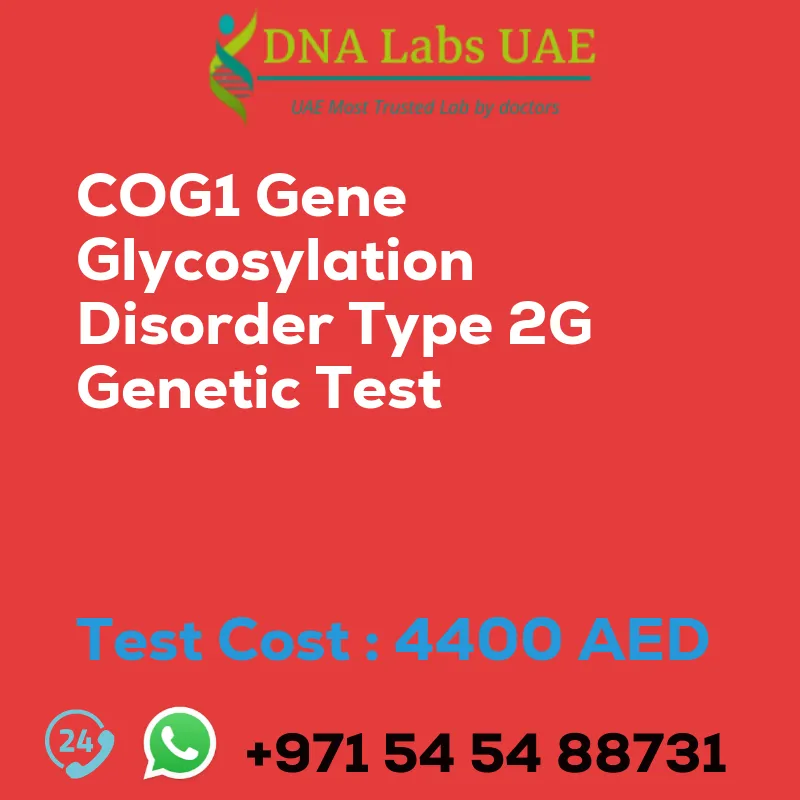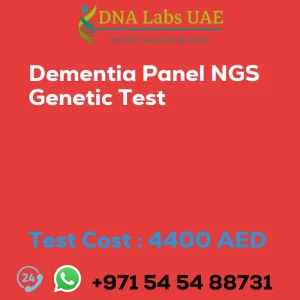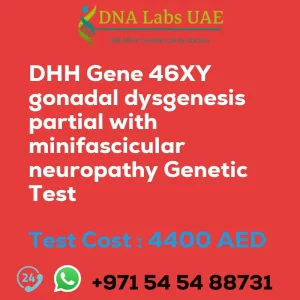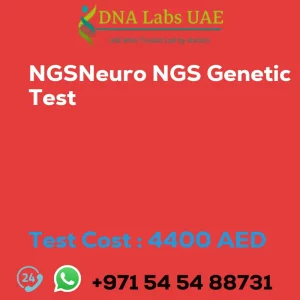COG1 Gene Glycosylation Disorder Type 2G Genetic Test
Welcome to DNA Labs UAE, a leading genetic laboratory offering advanced genetic testing services. In this blog post, we will provide detailed information about the COG1 Gene Glycosylation Disorder Type 2G Genetic Test, including its cost, symptoms, diagnosis, and more.
Test Name: COG1 Gene Glycosylation Disorder Type 2G Genetic Test
Components:
- Price: 4400.0 AED
Sample Condition:
- Blood or Extracted DNA or One drop Blood on FTA Card
Report Delivery:
- 3 to 4 Weeks
Method:
- NGS Technology
Test Type:
- Neurological Disorders
Doctor:
- Neurologist
Test Department:
- Genetics
Pre Test Information:
Before undergoing the COG1 Gene Glycosylation Disorder Type 2G NGS Genetic DNA Test, it is important to provide the following:
- Clinical History of the Patient
- A Genetic Counselling session to draw a pedigree chart of family members affected with COG1 Gene Glycosylation Disorder Type 2G
Test Details:
The COG1 gene glycosylation disorder type 2G NGS genetic test is a diagnostic tool that utilizes next-generation sequencing (NGS) technology to identify mutations in the COG1 gene. This gene is responsible for producing a protein involved in the process of glycosylation, which is crucial for the proper functioning of many cells in the body.
Glycosylation is the process of adding sugar molecules to proteins and lipids, which is essential for their stability, function, and localization within the cell. Mutations in the COG1 gene can disrupt this process, leading to a glycosylation disorder known as type 2G.
The COG1 gene glycosylation disorder type 2G NGS genetic test can help diagnose this condition by identifying mutations in the COG1 gene. The test can be performed on a blood or saliva sample, and results are typically available within a few weeks.
Early diagnosis of COG1 gene glycosylation disorder type 2G can significantly contribute to the management of symptoms and improve outcomes for affected individuals. Treatment options may include enzyme replacement therapy, dietary modifications, and other supportive measures.
At DNA Labs UAE, we are committed to providing accurate and reliable genetic testing services. If you suspect a COG1 gene glycosylation disorder type 2G or have any questions regarding our genetic testing services, please consult with a neurologist or contact our genetics department for further assistance.
| Test Name | COG1 Gene Glycosylation disorder type 2G Genetic Test |
|---|---|
| Components | |
| Price | 4400.0 AED |
| Sample Condition | Blood or Extracted DNA or One drop Blood on FTA Card o |
| Report Delivery | 3 to 4 Weeks |
| Method | NGS Technology |
| Test type | Neurological Disorders |
| Doctor | Neurologist |
| Test Department: | Genetics |
| Pre Test Information | Clinical History of Patient who is going for COG1 Gene Glycosylation disorder type 2G NGS Genetic DNA Test A Genetic Counselling session to draw a pedigree chart of family members affected with COG1 Gene Glycosylation disorder type 2G |
| Test Details |
COG1 gene glycosylation disorder type 2G NGS genetic test is a diagnostic tool that uses next-generation sequencing (NGS) technology to detect mutations in the COG1 gene. This gene is responsible for producing a protein that is involved in the process of glycosylation, which is essential for the proper functioning of many cells in the body. Glycosylation is the process of adding sugar molecules to proteins and lipids, which is important for their stability, function, and localization within the cell. Mutations in the COG1 gene can disrupt this process, leading to a glycosylation disorder known as type 2G. The COG1 gene glycosylation disorder type 2G NGS genetic test can help diagnose this condition by identifying mutations in the COG1 gene. This test can be performed on a blood or saliva sample, and results are typically available within a few weeks. Early diagnosis of COG1 gene glycosylation disorder type 2G can help with the management of symptoms and may improve outcomes for affected individuals. Treatment options may include enzyme replacement therapy, dietary modifications, and other supportive measures. |








